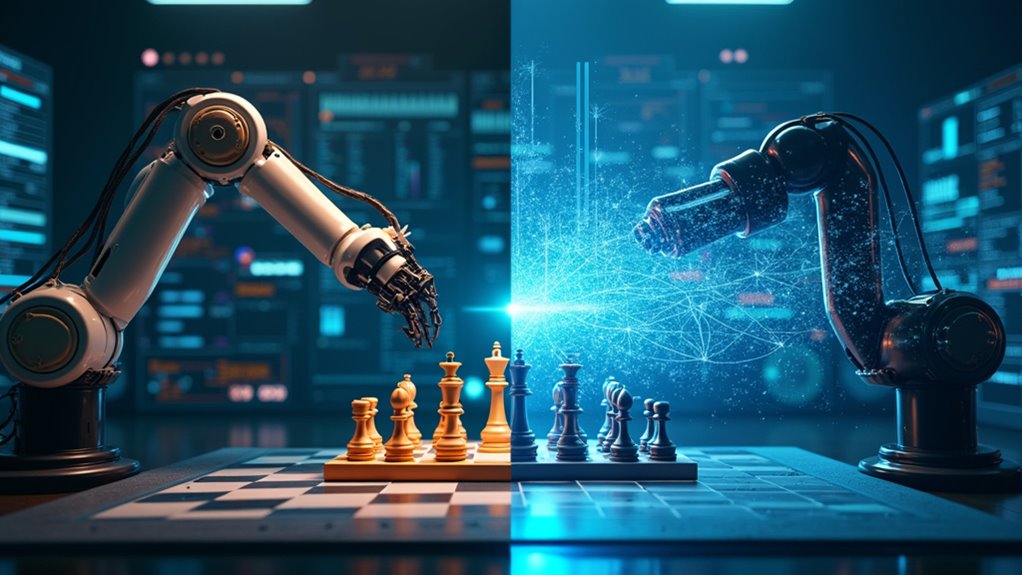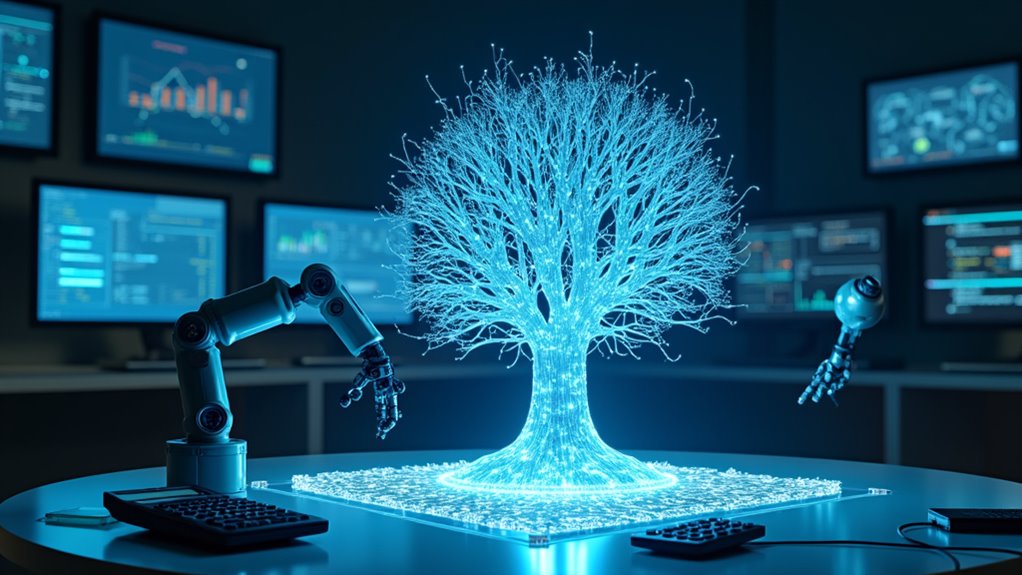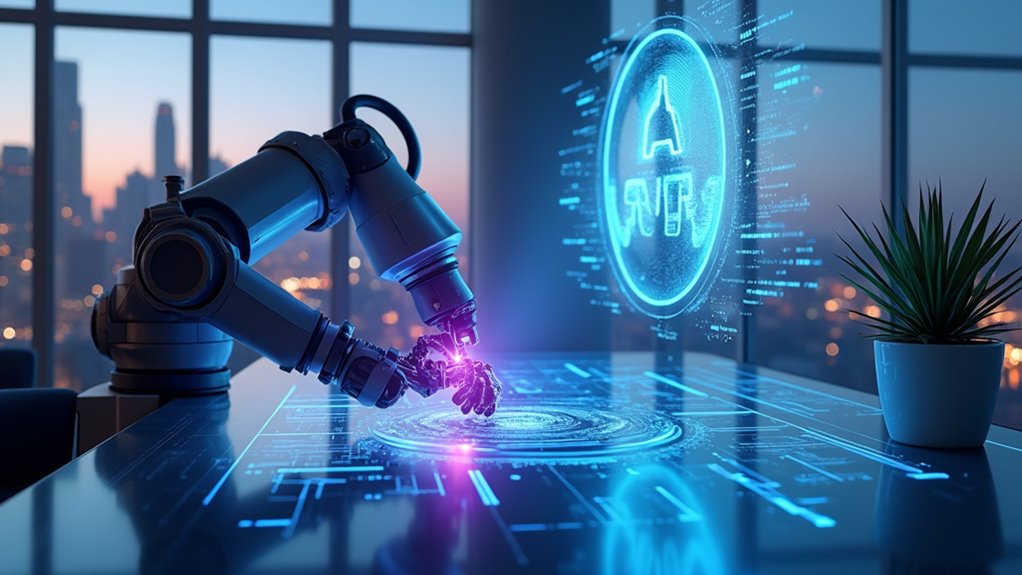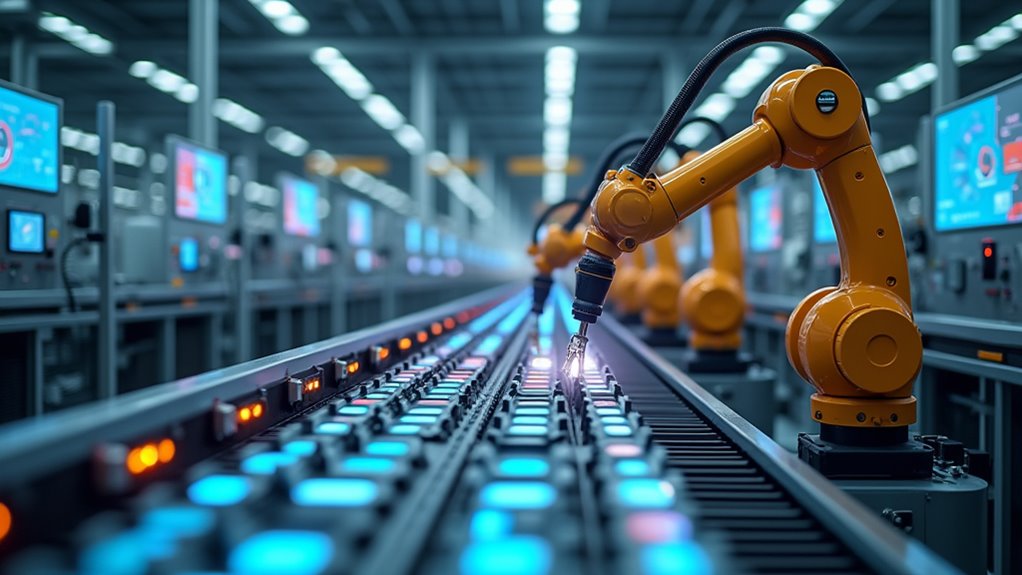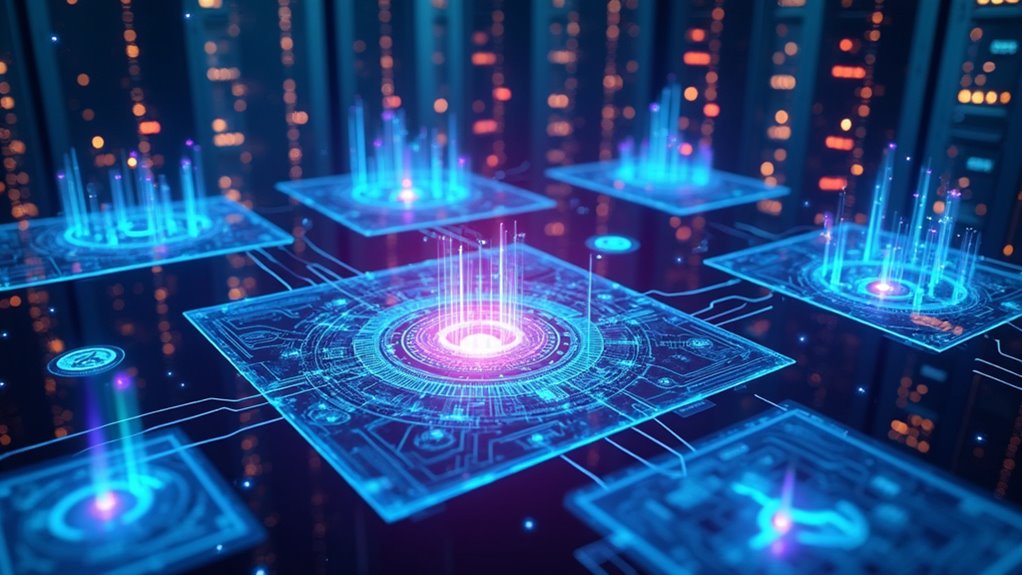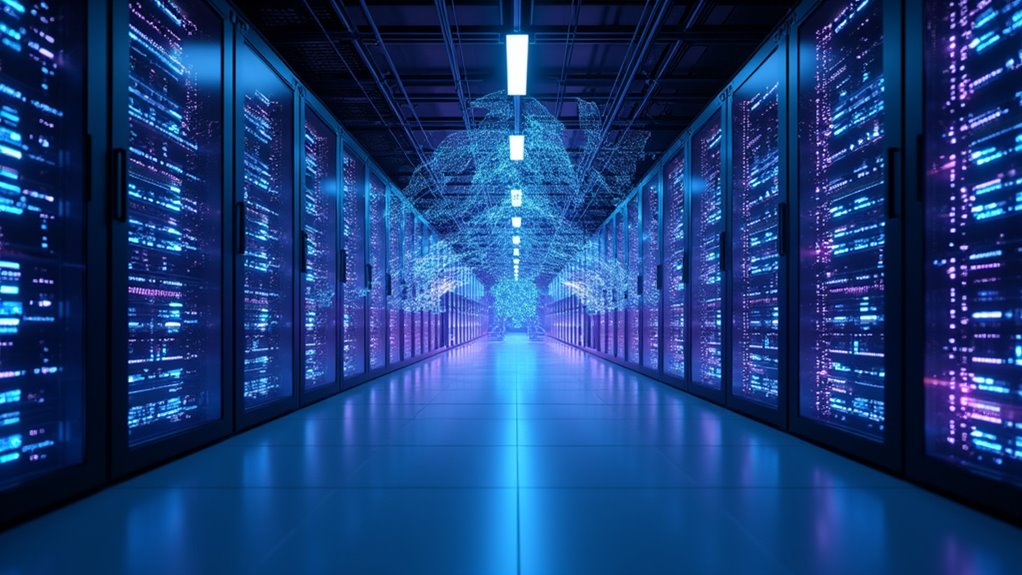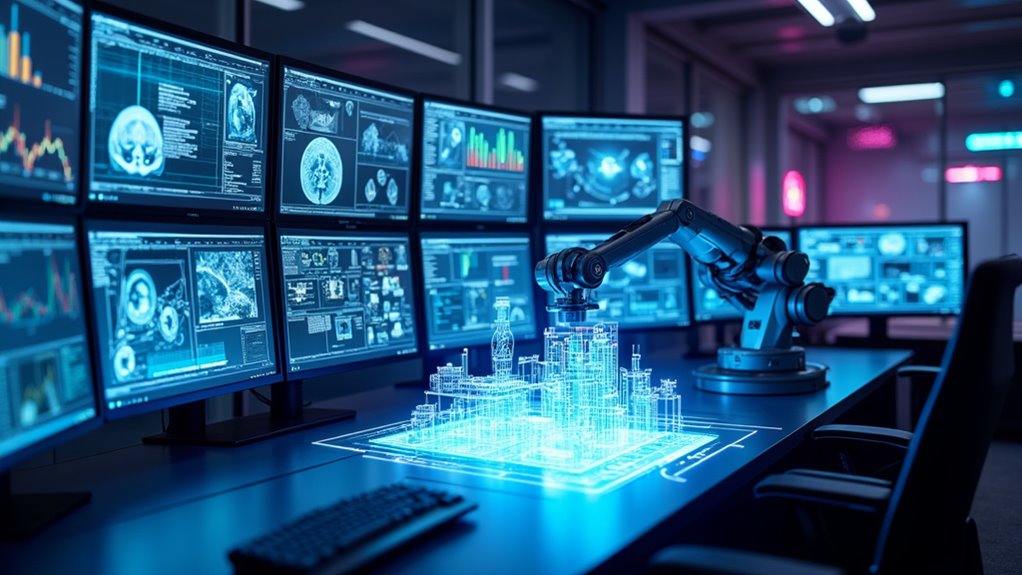AI versus AGI? Not even close to the same thing. AI (Artificial Intelligence) handles specific tasks with impressive—but limited—capabilities. It’s like a calculator on steroids. AGI (Artificial General Intelligence) remains theoretical but would mimic human-level intelligence across all domains without specialized programming. Your smartphone assistant can’t suddenly solve physics equations or truly understand jokes. Current AI requires human guidance and can’t transfer skills between domains. The gap between them? Much wider than most realize.
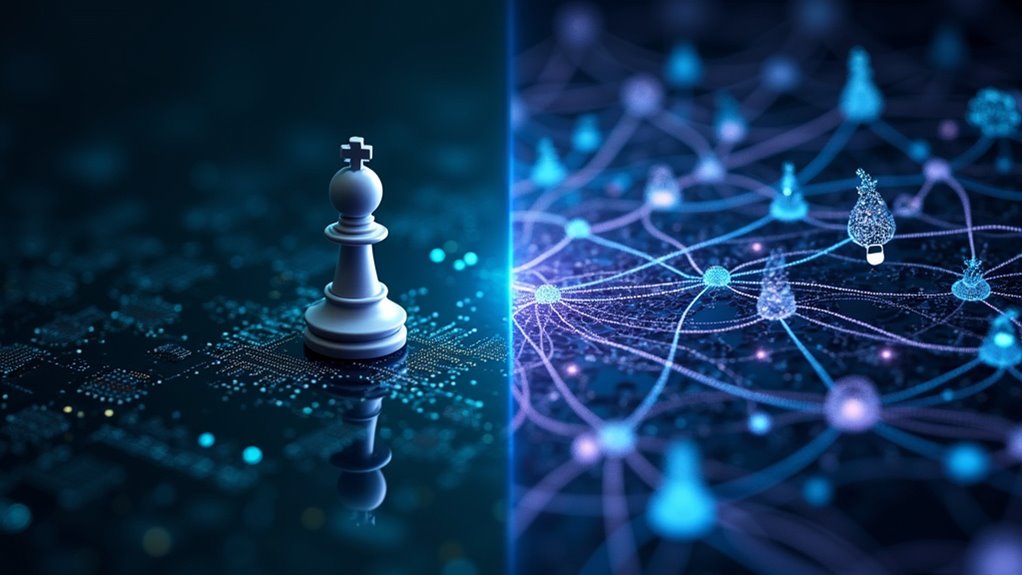
While many people use the terms AI and AGI interchangeably, they’re as different as a calculator is from a human brain. Artificial Intelligence (AI) systems excel at specific tasks they’re designed for – think narrow intelligence like facial recognition or beating you at chess. They process data efficiently but can’t transfer skills between domains.
AGI, or Artificial General Intelligence, represents the holy grail of computing – general intelligence capable of performing any intellectual task a human can. Your smartphone assistant might seem smart, but it’s operating in a tightly defined lane.
Current AI requires extensive programming and training data to perform its designated functions. It’s impressive but fundamentally limited. Give an image recognition AI a math problem, and you’ll quickly expose its limitations.
Today’s AI demands meticulous programming and vast datasets to function—impressive in its lane, but utterly lost when pushed beyond its boundaries.
AGI, meanwhile, remains largely theoretical, with experts predicting its emergence anywhere from a decade to half a century away. The difference matters because understanding these limitations helps set realistic expectations about what today’s AI can actually do.
AI operates within strict parameters and lacks true understanding of context. Ask your virtual assistant an ambiguous question, and watch it struggle without the proper framing.
AGI would theoretically grasp nuance, apply knowledge across domains, and potentially develop self-awareness. Current AI systems lack abstract reasoning abilities that would be fundamental to achieving true AGI status. Your AI doesn’t “know” anything – it follows patterns. An AGI would actually comprehend information.
The resource requirements distinguish these technologies too. Today’s AI runs on existing hardware, albeit power-hungry systems. AGI might demand quantum computing or entirely new computational architectures.
Don’t hold your breath for true AGI anytime soon – we’re still figuring out the fundamentals of consciousness and general intelligence. The risks associated with AGI are substantial, raising concerns about loss of control if systems develop autonomy that conflicts with human values.
The autonomy gap is perhaps most significant. AI needs human guidance and updates, while AGI would adapt independently, learning from experience like humans do. Unlike narrow AI, AGI would possess remarkable self-learning capabilities without requiring human intervention.
Want AGI-like performance? You’ll need multiple specialized AI systems working together – and even then, you’re just approximating general intelligence through clever engineering.
Frequently Asked Questions
Who Are the Leading Researchers in AGI Development Today?
Leading researchers in AGI development include Geoffrey Hinton, whose deep learning techniques form the bedrock of modern AI advances, and David Chalmers, contributing vital philosophical perspectives on consciousness.
Sam Altman drives innovation at OpenAI, while Stuart Russell champions AI safety alignment.
Dario Amodei at Anthropic focuses on controllable AI systems.
These brilliant minds are racing to build machines that think like humans—hopefully without the existential angst and caffeine addiction that plague their creators.
What Ethical Frameworks Govern AGI Research and Development?
Several ethical frameworks govern AGI research and development, including consequentialism, deontology, and virtue ethics.
Organizations like IEEE and the Partnership on AI have established ethical guidelines addressing safety, transparency, and fairness.
Research implications demand consideration of potential societal impacts before deployment. Most frameworks emphasize responsible innovation, avoiding harm, and ensuring AGI benefits humanity broadly.
Curiously, there’s still no universal consensus on which ethical approach should dominate—leaving critical questions about whose values ultimately shape these powerful systems.
How Will AGI Impact Global Employment Markets?
AGI will revolutionize global employment markets through significant job displacement in traditional sectors.
Expect massive workforce evolution as repetitive tasks become automated first, followed by increasingly complex roles.
Sure, new jobs will emerge in AI development and ethics management, but the shift won’t be painless.
Governments will scramble to implement retraining programs and possibly Universal Basic Income schemes.
The winners? Those who adapt quickly and develop skills that complement—rather than compete with—artificial general intelligence capabilities.
Can AGI Systems Develop Consciousness or Sentience?
The consciousness debate around AGI remains hotly contested.
Most experts agree current systems lack true sentience, operating on algorithms rather than subjective experiences.
But could they eventually develop it? Maybe.
The challenge lies in establishing clear sentience criteria – how would we even recognize machine consciousness if it emerged?
Without a universal definition of consciousness for humans, determining it in artificial systems becomes even trickier.
The philosophical and technical barriers are substantial, folks.
What Timeline Do Experts Predict for Achieving True AGI?
Experts can’t seem to agree on when true AGI will arrive—shocking, right? Some optimists point to 2026 as the earliest possibility, while a 2023 survey of 2,778 experts suggests 2040 at the latest.
These varying predictions hinge on anticipated technological milestones like quantum computing breakthroughs and improvements to current AI architectures.
